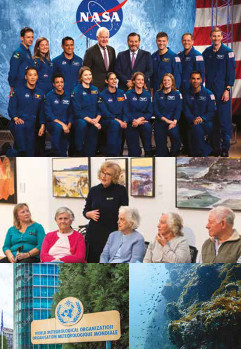News
Almost Half of NASA’s Latest Graduates are Women
Source: A.F.P
NASA honored its latest class of graduating astronauts in a ceremony at the Johnson Space Center in Houston, a diverse and genderbalanced group now qualified for spaceflight missions including America’s return to the moon and eventual journey to Mars.
After completing more than two years of basic training, the six women and seven men were chosen from a record-breaking 18,000 applicants representing a wide variety of backgrounds and specialties, from experienced pilots to scientists, engineers and doctors.
The group includes two candidates from the Canadian Space Agency (CSA), which has participated in a joint training program with the USA since 1983.
“They are the best of the best; they are highly qualified and very diverse, and they represent all of America,” said NASA Administrator Jim Bridenstine.
The group, known as the “Turtles”, has an unprecedented diversity of Indian, Iranian and other Asian and Spanish names. It is worth noting that NASA has about 48 active astronauts, and the new batch of members is now added to them.
Visiting Art Galleries May Prolong Your Life – New Study
Source: Reuters
A trip to the theater, museum or art gallery could help you live longer. And the more often you get that culture fix, the better, a new study suggests.
Researchers from University College London (UCL) found that people who engaged in the arts more frequently - every few months or more - had a 31% lower risk of dying early when compared to those who didn’t. Even going to the theater or museum once or twice a year was linked with a 14% lower risk.
“These leisure and pleasure activities that p eople d on’t t hink a s a h ealthrelated activity do support good health and longevity,” said Daisy Fancourt, an associate professor at UCL’s Research Department of Behavioral Science and Health, and an author of the study, published in The BMJ journal.
The researchers said the arts may help in longevity by improving mental health, enhancing social relationships and physical activity, and reducing loneliness, CNN reported.
Deep-Sea Microbe Sheds Light on Primordial Evolutionary Milestone
Source: Reuters
Researchers have scooped up a microorganism from the deep-sea mud off Japan’s coast, offering a major breakthrough for scientists to unlock the mystery of one of the watershed evolutionary events for life on Earth: the transition from the simple cells that first colonized the planet to complex cellular life — fungi, plants and animals.
Reuters reports that researchers studied the biology of the microorganism retrieved from depths of about 1.5 miles (2.5km), after coaxing it to grow in the laboratory. They named it Prometheoarchaeum syntrophicum, referring to the Greek mythological figure Prometheus who created humankind from clay.
Prometheoarchaeum’s spherical cell — with a diameter of roughly 500 nanometers, or one-20,000th of a centimeter — boasts long, often branching tentacle-like appendages on its outer surface.
It is part of a group called Archaea, relatively simple singlecell organisms lacking internal structures such as a nucleus. Scientists have long been puzzled over the evolutionary shift from such simple bacteria-like cells to the first rudimentary fungi, plants and animals — a group called eukaryotes — perhaps two billion years ago.
Based on a painstaking laboratory study of Prometheoarchaeum and observations of its symbiotic — mutually beneficial — relationship with a companion bacterium, the researchers offered an explanation.
WMO: 2019 Recorded Second-Hottest Temperatures
Source: Reuters
The World Meteorological Organization (WMO) has warned that the world should brace for extreme weather events like the bushfires ravaging Australia following a confirmation by independent analyses that 2019 was the earth’s second-hottest year since modern recordkeeping began in 1880.
The Geneva-based WMO combined several datasets, including two from the U.S. space administration NASA and the UK Met Office.
These showed that the average global temperature in 2019 was 1.1 degrees Celsius (2.0 Fahrenheit) above pre-industrial levels, creeping towards a globally agreed limit after which major changes to life on earth are expected.
“Unfortunately, we expect to see much extreme weather throughout 2020 and the coming decades, fuelled by record levels of heat-trapping greenhouse gases in the atmosphere,” said WMO Secretary-General Petteri Taalas.
U.S. scientists said it was clear from the data that greenhouse gas emissions were warming the planet.
According to Reuters, 2016 was recorded as the hottest year ever because of the heat caused by the severe El Nino phenomenon.








